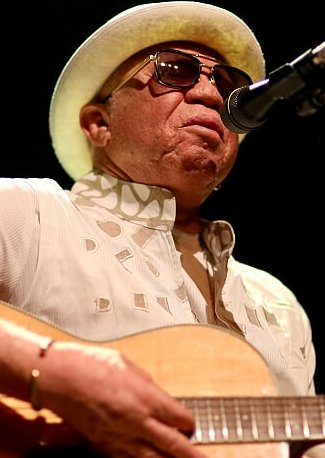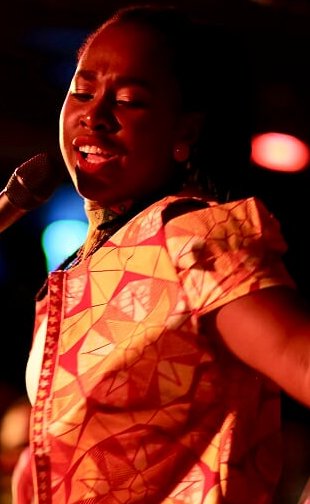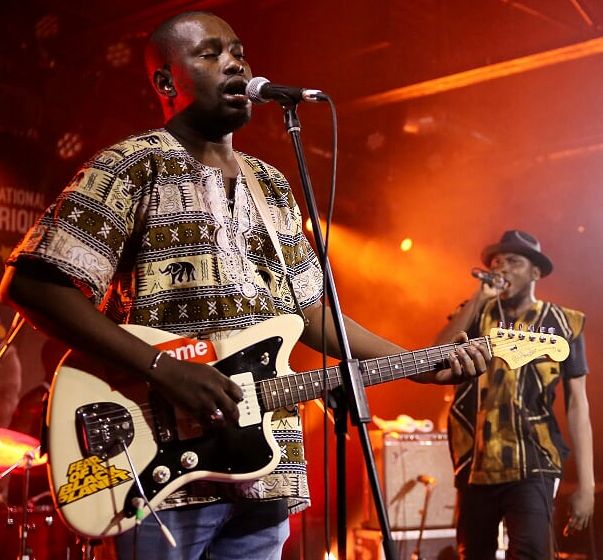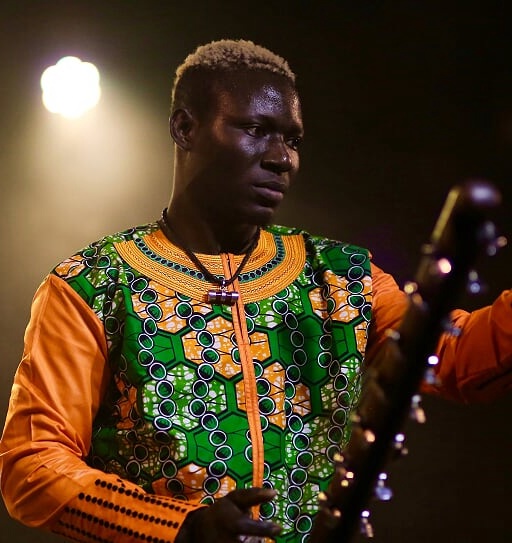Once a festival
survives its early years and begins to grow deep (natty) roots,
the perennial challenge is how to keep it fresh, exciting and
relevant.
It would be very
easy for a festival as prestigious as Montreal’s Festival
International Nuits d’Afrique to get by
on its reputation and let past success determine its future.
But the programmers are well aware that ‘change’
(flux) is the single most important constant in the universe,
and by keeping abreast of how the forms and formats of music
are constantly evolving, Les Nuits makes sure that it remains
at the forefront of what is happening on the ground and in the
studio as it concerns Africa’s indigenous music and its
quasi-conjugal relationship to world music; which is why, after
33 years, it continues to be one of the great voyages of discovery.
It’s not a coincidence that many African-born musicians
have decided to make Montreal their home. They know in advance
there will be both venues and audiences for their new ideas,
many of which will be programmed into the summer festival.
Despite the recent
(2017) changing of the guard in respect to its programming director
(Colin Rigaud takes over from Frédéric Kervadec),
Les Nuits d’Afrique continues to feature engaging new
music as well as the constant reminder that behind every music
there is a long-standing tradition.
 From
the highly personal, plaintive urgings of Mali-born albino Salif
Keita to the progressive reggae of Jamaica’s Jah9, there
is a vital link. Geographical and generational gap notwithstanding,
what they both share is having been at the wrong end of the
black and white intolerance spectrum, and being able to transmute
those negative experiences into the highest art.
From
the highly personal, plaintive urgings of Mali-born albino Salif
Keita to the progressive reggae of Jamaica’s Jah9, there
is a vital link. Geographical and generational gap notwithstanding,
what they both share is having been at the wrong end of the
black and white intolerance spectrum, and being able to transmute
those negative experiences into the highest art.
The counterpoint
to being black in America is to be albino in Africa. Noah Deshe’s
haunting film, White
Shadow, recounts in excruciating detail the challenges
of albinos in Ethiopa who are hunted for body parts and their
putative medicinal properties. In that same prejudicial spirit
that knows no borders, Mali's melanin-challenged Salif Keita,
a tribal prince by birth, was exiled by his family, and like
many under-appreciated American jazz musicians ended up settling
in Paris where his career took off.
Cape Verde’s
Elida Almeida informally opened the festival at the legendary
Club
Balattou. Her infectious enthusiasm and strong
voice underpinned original material that embodied both the folk
spirit of the island and the impact of globalization. Not to
be discounted was her stage presence and a smile that could
light up the darkest night which had the photographers reaching
for their best lenses. Of note was the time and space she gave
to her inventive and complicit guitarist Hernani Almeida.
Among the many
surprises of Les Nuits was the vagrant voice and compositions
of Jamaica’s Jah9 (Janine Cunningham). Unlike most reggae
singers, for whom the genre is a self-contained world with its
set-in-stone protocols, Jah9 makes traditional reggae a point
of departure, allowing it to absorb  and
react to the changing world around her, a world that now includes
women’s voices who, en masse, are finally challenging
the once inviolable male dominated world order.
and
react to the changing world around her, a world that now includes
women’s voices who, en masse, are finally challenging
the once inviolable male dominated world order.
Much like the Delta
blues had to leave the Delta to become everyone’s blues,
reggae, by responding to the world as it turns mostly sour-sop,
is no longer a strictly Jamaican product. Sometimes Jah9 would
slow things down such that the reggae seemed to waltz or sway,
transporting the listener to an enchanted place where the normally
thumping bass was reduced to a whisper. Her highly inventive
intros and memorable codas were the pitch-perfect bookends to
carefully conceived lyrics. But it was her voice, clean and
confident, that kept everything in its sure orbit around her
musical and political agenda. Sometimes she would extend a note
to emphasize a lyric, and then snap it back like a whip before
down-shifting into another tempo. Looking ahead everything looks
good for Jah9 whose already significant original material is
going to get better and take her to places where most reggae
composers fear to tread.
The best way to
capture the hybrid music of Mali’s scintillating Songhoy
Blues quartet is to situate them in their native land where
the lead singer, Aliou Touré, absorbs the style and substance
of griot jala while the guitarist, Garba Touré, develops
a liking for the quickly expiring plucked note as opposed to
the longer held western one. After an extended pit-stop in the
Mississippi Delta, the group cozies up to a high powered electrical
grid, and then does due diligence at the altar of Jimi’s
“Voodoo Child.” Songhoy Blues is emblematic of how
music gets made these days – and without apology. And
at the end of the set,  whether
you want more or less of it, you won’t forget the sound
and their fury. They don’t ask “Are You Experienced?”
They are the experience, and one that begs to be repeated. Inspired
by Garba Touré whose notes exploded out of his guitar
like pods bursting with seed, Songhoy Blues scaled the heights,
and were one of the lights of Montreal’s African nights.
whether
you want more or less of it, you won’t forget the sound
and their fury. They don’t ask “Are You Experienced?”
They are the experience, and one that begs to be repeated. Inspired
by Garba Touré whose notes exploded out of his guitar
like pods bursting with seed, Songhoy Blues scaled the heights,
and were one of the lights of Montreal’s African nights.
There’s nothing
that compares with the uplift and exultation of discovering
new talent that represents a new way of interpreting the world.
This year’s pleasant surprise category award goes to Mali’s
Djely Tapa, who brings unwavering commitment and  incandescent
intensity to her original material. Blessed with a voice that
can burn-dry a lake under a monsoon sky, its ear-pleasing purity
and specific gravity are such that it keeps all other instruments
and listeners in mesmerizing thrall. Her mix of tradition and
urban coupled with intriguing time signatures translate into
a music that is winning over audiences wherever she performs.
Be sure to hitch your wagon to this rising star.
incandescent
intensity to her original material. Blessed with a voice that
can burn-dry a lake under a monsoon sky, its ear-pleasing purity
and specific gravity are such that it keeps all other instruments
and listeners in mesmerizing thrall. Her mix of tradition and
urban coupled with intriguing time signatures translate into
a music that is winning over audiences wherever she performs.
Be sure to hitch your wagon to this rising star.
In the first of
the free concert series that begins at the midway point of the
festival at the Quartier des Spectacles in downtown Montreal,
Benin’s Benin International Musical put sparks into the
night featuring hymns bathed in celestial harmonies that seamlessly
morphed into rap and hip-hop. This wasn’t just another
variation of World Music; the world’s music in all its
richness and variety was on display, and the audience lapped
it up and danced it up until closing time.
After spending part
of the day wandering through the narrow corridors of the fascinating
Timbuctoo market place, to visiting food stalls offering exotic
dishes from around the world, and finally checking out the numerous
ateliers and workshops where dancers and musicians explain the
origins of the incredible range of Africa’s stringed and
percussion instruments, the case can be made that Les Nuits
is as much a cultural as a musical event.
Based on a quick
scan of world culture as it settles into the 21st century, it
should be of interest and concern to everyone that the once
ubiquitous halo and hijab have been replaced by headphones and
iPhones. For better or for worse, nomadism -- man’s founding,
primordial first condition -- has given way to a 'monadic' existence
and the triumph of the self-sufficient individual (In Canada,
30% of adults live alone). And whether we rue or revel in these
developments, they are happening on our watch, and there’s
nothing like music to help us grasp what cannot be put into
words.
From Berber tent
music on the fringes of the Sahara to state-of-the-art digital
recording studios, Les Nuits is a chronicling of the world through
sound, and is arguably one of the most edifying music festivals
on both sides of the equator.
Case in point is
Algeria’s beloved Hakim Salhi. His music typically begins
in the mournful drone we associate with the Sahara and its unforgiving
climate, out of which is born the high pitched ululation (zagharit)
indigenous to the Arabic world. But with a sudden tweaking
of the tempo and cranking up of the horn section along with
thumping thumb-slaps to the bass, Salhi exchanges his camel
for a Corvette and in a matter of a few bars of music the listener
is yanked out of the medina and injected into a particle accelerator
– and pure joy erupts as the crowd goes crazy. Despite
the infectious beat of the bass and drum, Salhi has not betrayed
traditional Algerian music to win the favours of the West, but
rather he has added his voice to the great catalogue of Algerian
music now fully integrated into the modern world. Salhi, who
in 75 years from now will be regarded as traditional by the
new generation, is challenging cultural norms by lending his
voice to the one-world-order concept that is in slow but sure
ascendancy.
* * * * * * * * * * *
Like no other event
of its kind, the all-inclusive Festival International Nuits
d’Afrique is a celebration of the human spirit and the
transcending power of creation, where for 13 glorious days and
nights all differences and disputes are magically dissolved
in the universal language of music.
For this precious
experience, a huge jrejëf goes to festival founder
and recipient of the order of Canada, Lamine Touré and
his exceptionally dedicated and dynamic team.
Next year Les Nuits
turns 34, and that can’t come soon enough.
ADDITIONAL
PHOTOS
